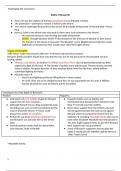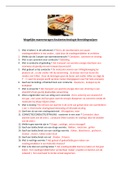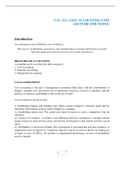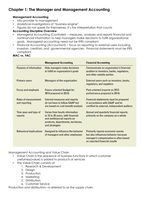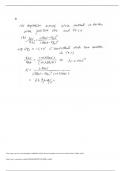Literature week 2 – Governance and Strategy
Bochove et al. (2018) Reconstructing the professional domain: Boundary
work of professionals and volunteers in the context of social service
reform
Many countries are looking for ways to make hc and social services more sustainable. Next
to market mechanisms for efficiency, policymakers are giving more responsibilities to
citizens to take care of themselves and others. In this active citizen regime, volunteers
(people who provide services to help others in their spare time without receiving payment,
usually in a formal or informal organization) play a big role. Volunteers are valued because
they are cheaper than paid professionals, and they have knowledge of service user’s needs
and their assumed contribution to social cohesion. There are conflicting expectations of
volunteers (that they have to be ‘professional’ and be trained, but also give warm instead of
distant care). This can lead to uncertainty.
Four main reasons for shifting from professionals to volunteers in social services:
- Governments hope that volunteers will fill the gaps that have resulted from austerity
policies and an increased need for social services.
- Volunteering is promoted as ‘the public production of citizens as heartfelt subjects’,
thusly contributing to social cohesion and solidarity.
- Volunteering is seen as a key to empowerment. People participate in society and are
thusly (hopefully) less dependent on government support.
- Governments aim to manage and improve the cooperation between the state and
the voluntary sector by creating collaborative partnerships aimed at encouraging
volunteering.
This article focuses on the situation in the NL, where a radical shift has happened in social
services. Citizens are now expected to turn to their social network before looking for help
form the government, and everyone is expected to participate in society (by working or
volunteering). In the past years, the NL has seen an increase in amount of volunteers in
(long-term/social) care, and a large decrease of paid jobs in this sector.
Profession: it is the outcome of processes of ‘isolation and boundary construction’ instead
of the outcome of ‘the intellectual division of labour’. However, only recently has nursing
and social work been looked at as a ‘profession’. The boundaries within social services
(between professionals and volunteers are fragile, also because some volunteers used to be
paid professionals themselves.
Boundary work: constantly crafted boundaries to distinguish between professionals and
pseudo-professionals. It is often understood as demarcation work, and includes efforts of
erecting and maintaining boundaries (e.g. through monopolization, expansion, exclusion
and protection). But it is also about bridging and crossing boundaries. Governments can
stimulate this by establishing interdisciplinary teams for example.
It is often found that a combination of demarcation and crossing/mitigating of boundaries
point to the gendered characters of hc/social work (that nursing is more considered to be a
‘female’ occupation). However nurses find their job more important than the title of
professional, which promotes boundary crossing. This is more likely to occur in traditionally
1
, female occupations and when professionals initiate it themselves. Boundary crossing can
keep the roles of actors and the hierarchy between them intact.
Professionals and volunteers demarcate differences between them in various ways
(boundary markers):
- Demarcation based on differences in knowledge and skills: many respondents
mentioned that volunteers have less specialized knowledge and skills than
professionals. This is generally the most important reason for differences between
their tasks and responsibilities.
- Based on status and authority: this is especially the case with community centers
and playgrounds, where volunteers and professionals overlap in the tasks they do.
However, despite this overlap volunteers were stated to be less equipped to exercise
authority because they did not have the same status as professionals. Boundaries
are marked by language as well as objects, like spatial privileges or clothing
(uniforms for professionals only).
- Based on predictability and reliability: professionals see the ‘no strings attached’
attitude of many volunteers as a disadvantage, while volunteers see it as a merit.
Professionals say they cannot count on them, as they sometimes don’t show up or
take it less seriously. Volunteers think it is normal to do these things, as they are not
being paid and doing it in their leisure time. However volunteers and professionals
both see these markers are important and legit differences that allows for
demarcations between their roles.
Welcoming work: inviting specific volunteers into the professional domain, where
differences between them were downplayed and volunteers were able to perform the
professional’s tasks. Three main differences with demarcation work: WW involves (partial)
deconstruction of boundaries, and DW is about constructing and maintaining boundaries.
WW is performed only by professionals, and DW involves both volunteers and professionals.
Lastly, WW is directed at specific volunteers whose qualities and competencies are
acknowledged by professionals, and DW is performed by professionals based on
assumptions about volunteers in general.
- Welcoming work based on similarities or differences in knowledge and skills:
sometimes certain volunteers are welcomed to do a certain task because of their
specific skills or competencies. This can also mean additional skills (that you don’t
learn in school or that bring that extra something to the job). Using the terms
professional and volunteer is often discouraged in WW (by professionals).
- Based on similarities or differences in status and authority: some volunteers are
welcomed in the professional domain either because they have similar sources of
authority as professionals, or possess certain sources that professionals claim not to
have (e.g. a distinct authoritative attitude).
- Based on similarities in predictability and reliability: when a volunteer has proven to
be as reliable as a professionals, they get certain privileges, e.g. being able to work
alone or be alone with the client.
In some cases, professionals demarcate boundaries and show that they are essential to the
job (and cannot be replaced by volunteers based on their lack of skills/essence). On the
other hand, volunteers are sometimes welcomed based on possessing certain skill (or due to
2
Bochove et al. (2018) Reconstructing the professional domain: Boundary
work of professionals and volunteers in the context of social service
reform
Many countries are looking for ways to make hc and social services more sustainable. Next
to market mechanisms for efficiency, policymakers are giving more responsibilities to
citizens to take care of themselves and others. In this active citizen regime, volunteers
(people who provide services to help others in their spare time without receiving payment,
usually in a formal or informal organization) play a big role. Volunteers are valued because
they are cheaper than paid professionals, and they have knowledge of service user’s needs
and their assumed contribution to social cohesion. There are conflicting expectations of
volunteers (that they have to be ‘professional’ and be trained, but also give warm instead of
distant care). This can lead to uncertainty.
Four main reasons for shifting from professionals to volunteers in social services:
- Governments hope that volunteers will fill the gaps that have resulted from austerity
policies and an increased need for social services.
- Volunteering is promoted as ‘the public production of citizens as heartfelt subjects’,
thusly contributing to social cohesion and solidarity.
- Volunteering is seen as a key to empowerment. People participate in society and are
thusly (hopefully) less dependent on government support.
- Governments aim to manage and improve the cooperation between the state and
the voluntary sector by creating collaborative partnerships aimed at encouraging
volunteering.
This article focuses on the situation in the NL, where a radical shift has happened in social
services. Citizens are now expected to turn to their social network before looking for help
form the government, and everyone is expected to participate in society (by working or
volunteering). In the past years, the NL has seen an increase in amount of volunteers in
(long-term/social) care, and a large decrease of paid jobs in this sector.
Profession: it is the outcome of processes of ‘isolation and boundary construction’ instead
of the outcome of ‘the intellectual division of labour’. However, only recently has nursing
and social work been looked at as a ‘profession’. The boundaries within social services
(between professionals and volunteers are fragile, also because some volunteers used to be
paid professionals themselves.
Boundary work: constantly crafted boundaries to distinguish between professionals and
pseudo-professionals. It is often understood as demarcation work, and includes efforts of
erecting and maintaining boundaries (e.g. through monopolization, expansion, exclusion
and protection). But it is also about bridging and crossing boundaries. Governments can
stimulate this by establishing interdisciplinary teams for example.
It is often found that a combination of demarcation and crossing/mitigating of boundaries
point to the gendered characters of hc/social work (that nursing is more considered to be a
‘female’ occupation). However nurses find their job more important than the title of
professional, which promotes boundary crossing. This is more likely to occur in traditionally
1
, female occupations and when professionals initiate it themselves. Boundary crossing can
keep the roles of actors and the hierarchy between them intact.
Professionals and volunteers demarcate differences between them in various ways
(boundary markers):
- Demarcation based on differences in knowledge and skills: many respondents
mentioned that volunteers have less specialized knowledge and skills than
professionals. This is generally the most important reason for differences between
their tasks and responsibilities.
- Based on status and authority: this is especially the case with community centers
and playgrounds, where volunteers and professionals overlap in the tasks they do.
However, despite this overlap volunteers were stated to be less equipped to exercise
authority because they did not have the same status as professionals. Boundaries
are marked by language as well as objects, like spatial privileges or clothing
(uniforms for professionals only).
- Based on predictability and reliability: professionals see the ‘no strings attached’
attitude of many volunteers as a disadvantage, while volunteers see it as a merit.
Professionals say they cannot count on them, as they sometimes don’t show up or
take it less seriously. Volunteers think it is normal to do these things, as they are not
being paid and doing it in their leisure time. However volunteers and professionals
both see these markers are important and legit differences that allows for
demarcations between their roles.
Welcoming work: inviting specific volunteers into the professional domain, where
differences between them were downplayed and volunteers were able to perform the
professional’s tasks. Three main differences with demarcation work: WW involves (partial)
deconstruction of boundaries, and DW is about constructing and maintaining boundaries.
WW is performed only by professionals, and DW involves both volunteers and professionals.
Lastly, WW is directed at specific volunteers whose qualities and competencies are
acknowledged by professionals, and DW is performed by professionals based on
assumptions about volunteers in general.
- Welcoming work based on similarities or differences in knowledge and skills:
sometimes certain volunteers are welcomed to do a certain task because of their
specific skills or competencies. This can also mean additional skills (that you don’t
learn in school or that bring that extra something to the job). Using the terms
professional and volunteer is often discouraged in WW (by professionals).
- Based on similarities or differences in status and authority: some volunteers are
welcomed in the professional domain either because they have similar sources of
authority as professionals, or possess certain sources that professionals claim not to
have (e.g. a distinct authoritative attitude).
- Based on similarities in predictability and reliability: when a volunteer has proven to
be as reliable as a professionals, they get certain privileges, e.g. being able to work
alone or be alone with the client.
In some cases, professionals demarcate boundaries and show that they are essential to the
job (and cannot be replaced by volunteers based on their lack of skills/essence). On the
other hand, volunteers are sometimes welcomed based on possessing certain skill (or due to
2

